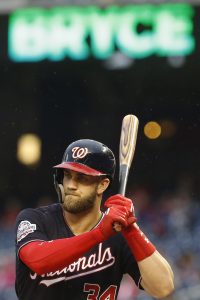As it plodded forward over a period of months, the free agency of Bryce Harper was more laborious than intriguing for the outside observer. But the twists and turns, the strategies and stratagems, and the overriding uncertainty that blanketed the process are all much more interesting when told in a retrospective, narrative form. In a subscriber-only post, Matt Gelb of The Athletic has penned one of the most fascinating hot stove stories in memory regarding the Phillies’ high-stakes offseason, which culminated recently with the signing of Harper. The 26-year-old star set out seeking a record-setting deal in all aspects (length, guarantee, AAV), per Gelb. He also told the Philadelphia organization during their mid-January meeting that he wanted to pick a long-term home and wasn’t interested in opt-outs. Meanwhile, the club was amply willing to make a lengthy commitment, so long as the competitive balance tax burden wasn’t too onerous. The club’s initial $330MM offer was for a 15-year term, with the final deal coming together when the Phils agreed to knock two years off of the length. By the end of the impeccably crafted article, Harper’s free agent process feels like a roller coaster — a thrilling ride with an utterly predictable result. As Gelb puts it, at the moment of decision, the organization realized that this was “a lifetime deal, a marriage between a starved franchise and the game’s most marketable star.”
Frankly, there’s no substitute for reading the full account, which paints a vibrant picture of the Phils’ winter efforts. Here’s more from the National League:
- Although the Dodgers remain hopeful that Clayton Kershaw will be ready to make his ninth consecutive Opening Day start, manager Dave Roberts acknowledged to reporters Monday that the left-hander may not be ready to go come March 28 (link via Mike DiGiovanna of the L.A. Times). Kershaw threw from 60 to 70 feet Monday, per DiGiovanna, and Roberts indicated that the lefty continues to trend in the right direction. Even if Kershaw isn’t ready for the opener, there’s no indication to this point that he’d need to miss significant time early in the season. Indeed, as MLB.com’s Ken Gurnick tweets, Roberts says that Kershaw emerged from his throwing session today feeling “pretty excited” with how he felt. Understandably, Roberts also suggested that there’s too much emphasis being placed on Opening Day. If Kershaw isn’t ready to go, the Dodgers will still have Walker Buehler, Hyun-Jin Ryu, Rich Hill, Kenta Maeda, Julio Urias and Ross Stripling as viable rotation pieces, with Brock Stewart and Caleb Ferguson serving as depth options.
- Padres skipper Andy Green has suggested that the main factor in determining whether lefty Matt Strahm will be in the rotation or bullpen will simply be whether he’s able to get stretched out this spring, Kevin Acee of the San Diego Union-Tribune tweets. Strahm tossed 40 pitches in today’s three-inning spring outing, Acee notes, which could bode well for the southpaw’s chances given that there are still three weeks of camp remaining. Strahm, 27, was primarily a reliever in San Diego last season but has started at the minor league level in the past — primarily with the Royals. While Strahm shined as a bullpen option in San Diego last season, it’s understandable that the Friars would want to see if they could potentially coax more innings out of the intriguing southpaw.

